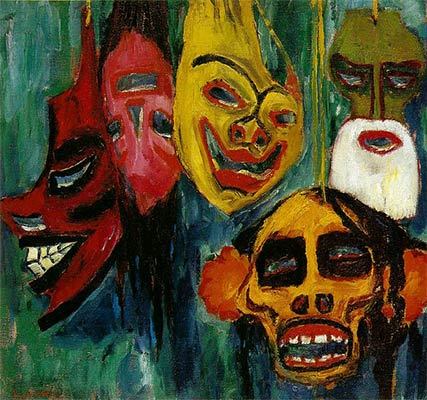- Apr 2017
-
annotatingausten.sfsuenglishdh.net annotatingausten.sfsuenglishdh.net
-
palm
"To impose (something) fraudulently on, upon . . . a person. Now chiefly with off: to pass off by trickery, fraud, or misrepresentation" (OED).
-
M.P
"A Member of Parliament; a person holding this title" (OED).
-
silly
"Of a person: lacking in judgement or common sense; foolish, thoughtless, empty-headed; characterized by ridiculous or frivolous behaviour" (OED).
-
temporising
"Temporary compliance" (OED)
-
-
static1.squarespace.com static1.squarespace.com
-
a rebellion a rebellion
But rebellions themselves are dependent on viewpoint, as well. What might be called a "rebellion" by the rebels if they succeed might also be called a riot by the dominant forces should the rebellion fail.
Rebellion definition: an act of violent or open resistance to an established government or ruler.
Riot definition: a violent disturbance of the peace by a crowd.
-
-
annotatingausten.sfsuenglishdh.net annotatingausten.sfsuenglishdh.net
-
acuteness
A person’s intelligence or cleverness (OED).
-
raillery
"Good-humoured ridicule or banter, often disguising a serious purpose; teasing, mockery" (OED).
-
- Mar 2017
-
static1.squarespace.com static1.squarespace.com
-
[dessiner]
I like the inclusion of the original French words throughout this piece, because I think they add more depth and dimension to Derrida's argument. For instance, "dessiner" can be translated into English as "depict" but it's more direct translation is "draw." I'm actually curious if the inclusion of the original French was something that Derrida insisted upon in the English version (and that's just me assuming that he wrote this text in his native French...) or whether that was an decision made by the editor(s) of this version? Anyway, these alternative French words and their alternative definitions/English translations have got me thinking here about Byron's earlier annotation, when he undertook defining polysemy...
-
- Feb 2017
-
static1.squarespace.com static1.squarespace.com
-
columbarium
definition of columbarium: a structure of vaults lined with recesses for cinerary urns
-
metonymies,
-
-
static1.squarespace.com static1.squarespace.com
-
static1.squarespace.com static1.squarespace.com
-
topoi
Definition: plural of Greek topos meaning a convention or motif, especially in a literary work; a rhetorical convention; a standardized method of constructing or treating an argument
-
-
static1.squarespace.com static1.squarespace.com
-
First, The ideas they stand for are very com-plex, and made up of a great number of ideas put together.
Is this not applicable for all words? I suppose I've always thought that the definition/meaning of a word as intersectional; different interpretations or significations inform one another in a kind of network of accumulation.
-
-
thefunambulist.net thefunambulist.net
-
static1.squarespace.com static1.squarespace.com
- Dec 2016
-
tressiemc.com tressiemc.com
-
animus
n. "An attitude that informs one's actions; disposition" - wordnik
-
- Jul 2016
-
books.google.ca books.google.ca
-
Pages 119 and 120
Here Borgman discusses the various definitions of data showing them working across the fields
the following definition of data is widely accepted in this context: AT&T portable representation of information in a formalized manner suitable for communication, interpretation, or processing. Examples of data include a sequence of bits, a table of numbers, the characters on a page, recording of sounds made by a person speaking Ori moon rocks specimen. Definitions of data often arise from Individual disciplines, but can apply to data used in science, technology, the social sciences, and the humanities: data are facts, numbers, letters, and symbols that describe an object, idea, condition, situation, or other factors.... Terms data and facts are treated interchangeably, as is the case in legal context. Sources of data includes observations, complications, experiment, and record-keeping. Observational data include weather measurements... And attitude surveys... Or involve multiple places and times. Computational data result from executing a computer model or simulation.... experimental data include results from laboratory studies such as measurements of chemical reactions or from field experiments such as controlled Behavioral Studies.... records of government, business, and public and private life also yield useful data for scientific, social scientific, and humanistic research.
-
-
www.historytoday.com www.historytoday.com
-
degradation
definition: fall in quality, decline
-
oxymoron
definition: idea that contradicts itself
-
stagnation
definition: lack of progress/growth
-
- May 2016
-
annotatingausten.sfsuenglishdh.net annotatingausten.sfsuenglishdh.net
-
turban
“A woman’s hat designed to resemble a turban” (OED). This was a fashionable headdress for women from the 1790's through the 1820's, inspired by English trade with India (Walford, Vintage Fashion Guild).

-
a large Newfoundland puppy and two or three terriers
According to the American Kennel Club, The Newfoundland is a massive breed of English working dog, used for pulling nets, carts, and carrying loads. Newfoundlands also make excellent guard dogs. Henry's puppy would look something like this,
 but would grow to be a very large dog.
but would grow to be a very large dog.

Terrier is a group of breeds, originally bred to hunt vermin. Some examples include the West Highland White Terrier,
 Cairn Terrier,
Cairn Terrier,  and Norfolk Terrier.
and Norfolk Terrier. 
These dogs were kept not only as companions, but as useful parts of the household: the Terriers to control rats and other vermin, and the Newfoundland (when grown) for protection and labor. Even so, the Newfoundland’s sweet disposition would make for an ideal companion (American Kennel Club).
-
rhodomontade
"Boastful or inflated talk or behavior." Also spelled rodomontade, it is pronounced rädəmənˈtād (OED).
-
phaetons
"A type of light four-wheeled open carriage, usually drawn by a pair of horses, and having one or two seats facing forward" (OED).

-
perturbation
"Anxiety; mental uneasiness" (OED).
-
coxcomb
"A fool, simpleton (obs.); now, a foolish, conceited, showy person, vain of his accomplishments, appearance, or dress; a fop; ‘a superficial pretender to knowledge or accomplishments’" (OED).
-
parsonage
"The church house provided for a rector. Also (in later use): the house of any benefice member of the clergy of the Church of England; the residence of any minister of religion" (OED).

-
tete–a–tete
"A private conversation between two people" (OED).
-
coquette
"A woman (more or less young), who uses arts to gain the admiration and affection of men, merely for gratification of vanity or form of desire of conquest and without any intention of responding to the feelings aroused. A flirt" (OED).
-
curate
"A member of the clergy engaged as assistant to a vicar, rector, or parish priest", or "A minister with pastoral responsibility" (OED). In this context, Henry either has engagements (appointments) to keep with his assistant, or he has engagements (duties) of his own as a clergyman.
-
pleasure–ground
"A piece of land set aside for recreation and enjoyment, esp. one ornamented and laid out for this purpose" (OED). These were generally in the form of a garden attached to an estate, as below.

-
post–masters
"A person with official charge of post. The official at each of the stations or stages of a post-road; primary duty to carry mail to the next state" (OED).
-
avarice
"Inordinate desire of acquiring and hoarding wealth; greediness of gain, cupidity" (OED).
-
caricature
"Grotesque or ludicrous representation of persons or things by exaggeration of their most characteristic and striking features" (OED).
-
servile
"Belonging to the serving class; of low social status; engaged in ‘servile’ or mechanical occupations" (OED).
-
post–boy
"A boy who carries and delivers post; a boy or man who rides express. Delivers letters, newspapers, dispatches, etc." (OED).
-
inquietude
"Restlessness (of the body) caused by pain, uneasiness, or debility" (OED).
-
pump–room
"A room or building where a pump is housed or worked; spec. a place at a spa where the medicinal water is dispensed" (OED).
-
Mechlin
A type of lace, so called because it was primarily produced in Mechelen, Belgium. It was also produced in Antwerp and Brussels. It was very popular throughout the 18th century, but the "disappearance of lace ruffles before 1780 from women's sleeves, and the disappearance of the cravat and men's ruffles" seriously reduced its place in fashionable dress (http://belovedlinens.net/lace/Mechlin.html ).

-
hack post–chaise
An extension of the phrase a hackney horse, a "horse let out for hire; depreciatively, a sorry or worn out horse; a jade" (OED). 'Post-chaise' refers to a "horse-drawn, usually four-wheeled carriage (in Britain usually having a closed body, the driver or postilion riding on one of the horses) used for carrying mail and passengers, esp. in the 18th and early 19th centuries" (OED). Therefore, 'hack post-chaise' means that the entirety of the post-chaise was hired and not owned.
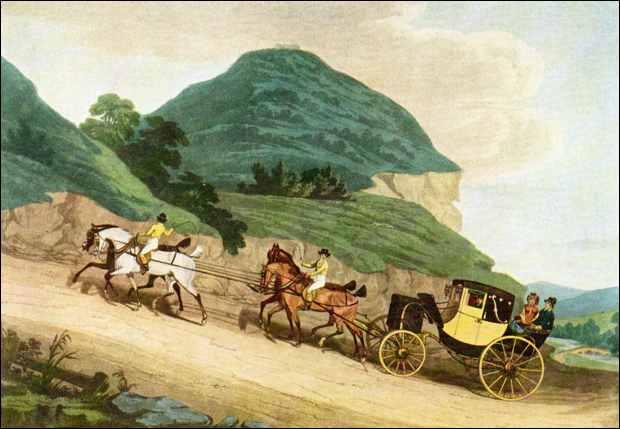
-
extenuation
"The action of lessening, or seeking to lessen, the guilt of (an offense or fault) by alleging partial excuses; an instance or means of doing this; a plea in mitigation of censure" (OED).
-
housekeeper
"A person, traditionally the female head of a household, who manages the running of a household" (OED).
In this context, housekeeper means the female head of the household, typically the wife of the homeowner, not a domestic servant.
-
cravats
“A long, narrow piece of linen, muslin, or other fine cloth, worn around the neck and either tied under the chin in a knot or bow with long flowing ends” (OED).
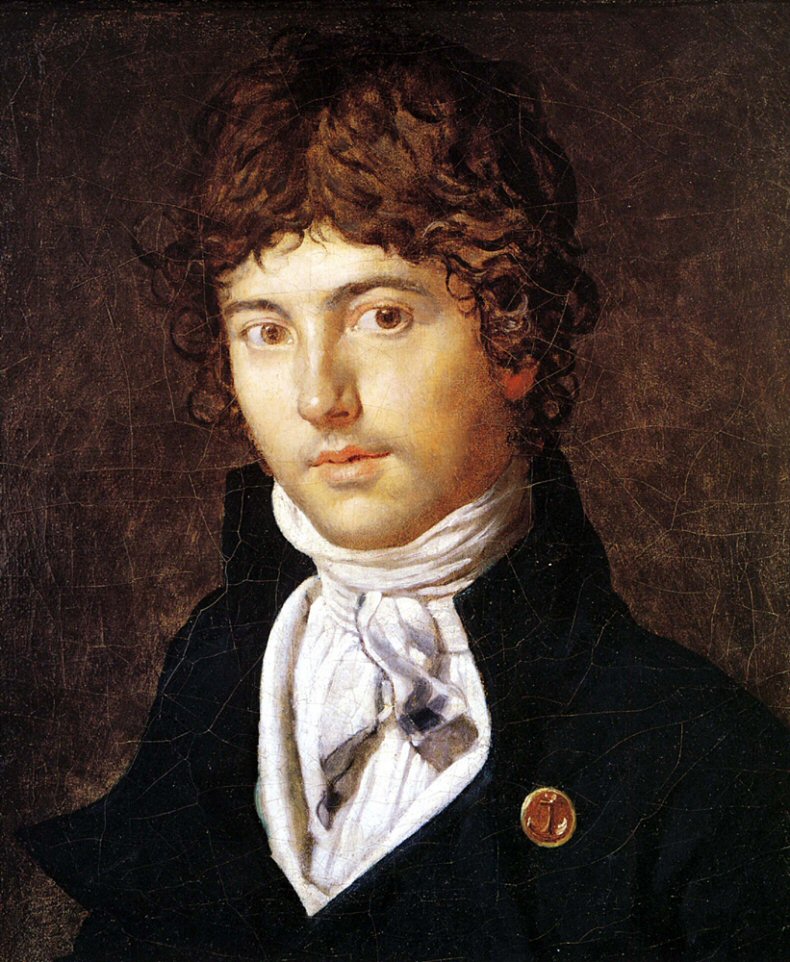
-
portionless
“Without a dowry” (OED).
-
-
annotatingausten.sfsuenglishdh.net annotatingausten.sfsuenglishdh.net
-
arch
Usually referring to, "women and children, and esp. of their facial expression: Slily saucy, pleasantly mischievous" (OED).
-
abbeys
An abbey is "A private residence, school, etc., formerly (part of) an abbey" (OED).
-
a traveling–chaise and four
A traveling chaise was a mode of quick transportation used by rich people, in the eighteenth century. This type of chaise was a closed carriage, which was equipped with four horses. The equipage, which was expensive, was generally composed of two men driving the two horses at the front and sometimes one postilion seated at the back ("Legacy Owensboro").

-
approbation
"The action of formally or authoritatively declaring good or true; sanction" (OED).
-
sanguine
"Of persons and expectations, etc.; Hopeful or confident with reference to some particular issue" (OED).
-
postilions
"A person who rides the leading, left-hand side horse drawing a coach or carriage, esp. when only one pair is used and there is no coachman" (OED).
-
Rumford
A Rumford was a modern type of fireplace. It was a sign of wealth if someone could afford to update their fireplace to the fashionable style.
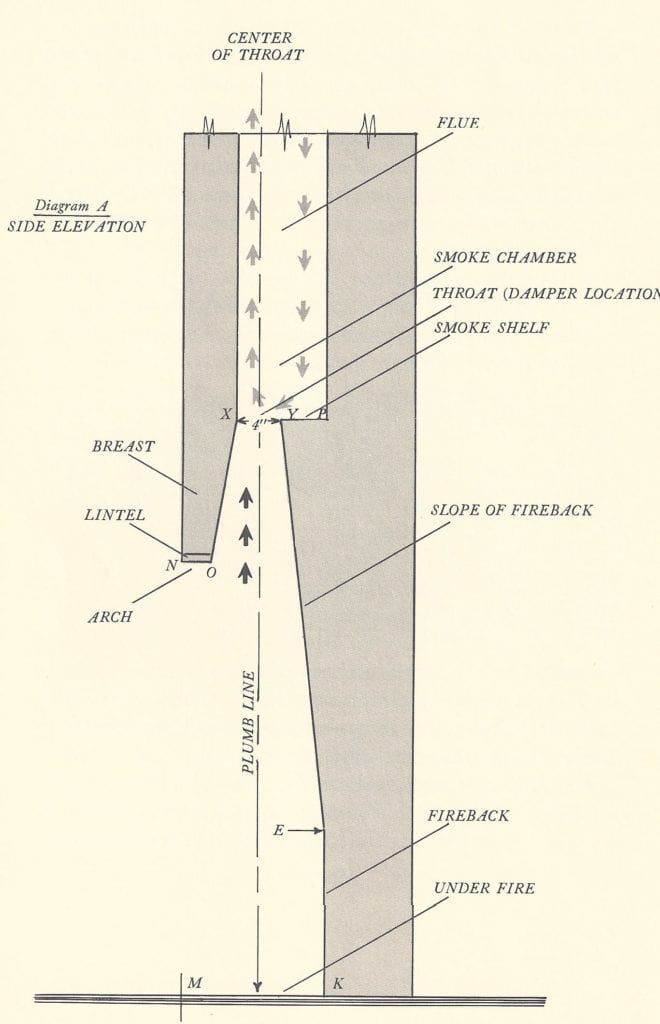
-
niggardly
"In a niggardly manner; parsimoniously, grudgingly, sparingly; unwilling to spend money." (OED).
-
mizzling
"Fine rain or drizzle" (OED).
-
lodges
"A place to accommodate or hold something" (OED).
-
dissolution
"Separation into parts or constituent elements" (OED).
-
on Saturday se’nnight
"Meaning in a weeks time" (OED).
-
conceited
"Conceited, in this case and usage is not just thinking well of oneself but, being witty, amusing; employing or characterized by conceits" (OED).
-
borne
"Something carried, sustained, endured, etc" (OED).
-
to be introduced to her
"To make known in person, esp. in a formal manner, with announcement of name, title, or other identification" (OED).
-
-
annotatingausten.sfsuenglishdh.net annotatingausten.sfsuenglishdh.net
-
habit
"Bodily apparel or attire; clothing, raiment, dress" (OED). Here, it most likely refers to a riding habit, which was worn by women when riding a horse. The riding habit had also become fashionable to wear while traveling (Jane Austen's World, Vic, "Women’s Riding Outfits in the Early 18th Century").
-
breeches–ball
Since the washing of clothes was quite infrequent in Austens day, this was a method of dry cleaning. "A ball of composition for cleaning breeches" (OED).
-
counterpane
"The outer covering of a bed, generally more or less ornamental, being woven in a raised pattern, quilted, made of patch-work, etc.; a coverlet, a quilt" (OED).
-
pamphlets
Unlike the typical pamphlets we may think about today, in this era, pamphlets were used for political information.
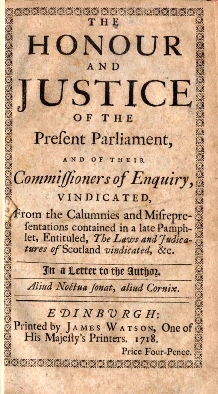
-
hair–powder
In Austen's time hair powder was essential for wigs to ensure freshness. It was white in color and commonly used with people of higher hierarchal status. “A scented powder made of fine flour or starch, used in the 18th c. for sprinkling the hair or wig in hairdressing” (OED).
-
massy
"Consisting of a large mass or masses of heavy material; of great size and weight; massive. Of a building: consisting of great blocks of masonry" (OED).
-
scullery
“A small room attached to a kitchen, in which the washing of dishes and other dirty work is done” (OED).


-
lassitude
"The condition of being weary whether in body or mind; a flagging of the bodily or mental powers; indifference to exertion; weariness; an instance of this" (OED).
-
netting–box,
"Is a box that contains mesh, network and supplies for netting sails and other various items" (OED).
-
supernatural
"Belonging to a realm or system that transcends nature, as that of divine, magical, or ghostly beings; attributed to or thought to reveal some force beyond scientific understanding or the laws of nature; occult, paranormal" (OED).
-
God
“Modern capitalization patterns for this word only became well established during the 18th century” (OED).
-
ere
“Before; sooner than” (Johnson).
-
abatement
The act of abating. Abate: “To lessen, to diminish” (Johnson).
-
erred
Past Tense of Err, "An error, fault; also, erroneous belief, heresy"(OED).
-
satin
“A silk fabric with a glossy surface on one side”(OED).

-
cloister
"A covered walk or arcade connected with a monastery, college, or large church, serving as a way of communication between different parts of the group of buildings”(OED).


-
Alas! It was snuffed and extinguished in one.
In Jane Austen's time, snuffing a candle meant "to free from the snuff, by pinching or cutting this off, or removing it with a special instrument" (OED). This allowed the candle to burn brighter.
-
but it was japan, black and yellow japan of the handsomest kind
Japan was a black varnish imported from Japan that had an exceptional hard finish. Japan could also refer to a piece done in the Japanese style that was "varnished, and adorned with painted or raised figured" (OED).
-
housemaids
“Originally: a female domestic servant, esp. one in charge of the reception rooms and bedrooms. Now more generally: a woman who is employed to perform various domestic tasks, esp. cleaning, in a person's home, a hotel, etc” (OED).
-
dishabille
"The state of being partly undressed, or dressed in a negligent or careless style; undress" (OED).
-
supposititious
"Put by devious means in the place of another; fraudulently substituted for the genuine thing or person" (OED).
-
-
annotatingausten.sfsuenglishdh.net annotatingausten.sfsuenglishdh.net
-
Captain
"Originally Captain-Lieutenant, becoming Captain in 1772. Lat. capitaneus "chieftain", from Lat. caput "head". Chieftain or head of a unit. As armies evolved his post came to be at the head of a company, which by the Sixteenth Century was usually 100 to 200 men. That seemed to be the number one man could manage in battle" (Harding, British Army Ranks).
-
muff
"A covering, often of fur and usually of cylindrical shape with open ends, into which both hands may be placed for warmth. Now chiefly hist" (OED) .

-
tippet
"A long narrow slip of cloth or hanging part of dress, formerly worn, either attached to and forming part of the hood, head-dress, or sleeve, or loose, as a scarf or the like" (OED).
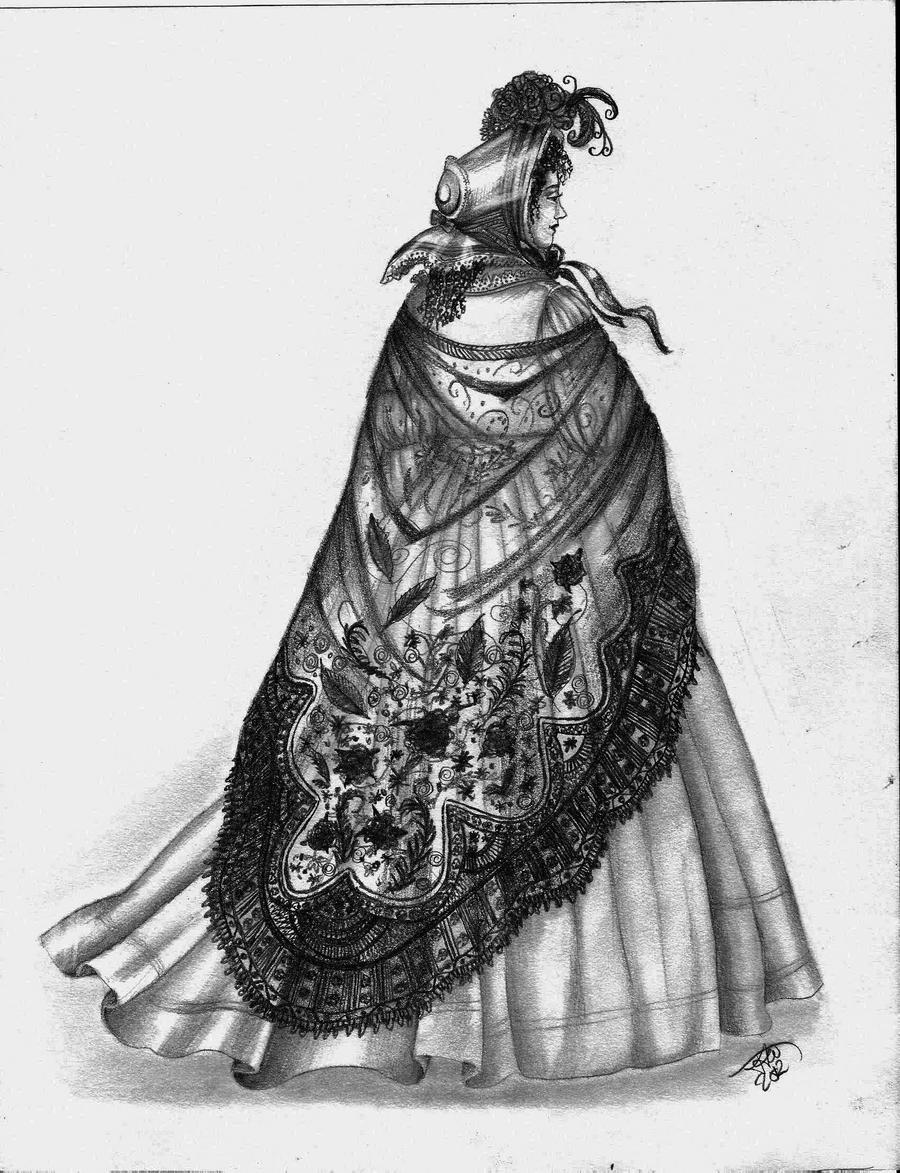
-
road–books
"A book of maps showing the roads of a district or country, often having additional information of interest to travellers or motorists; (also formerly) a book describing particular roads or routes" (OED).
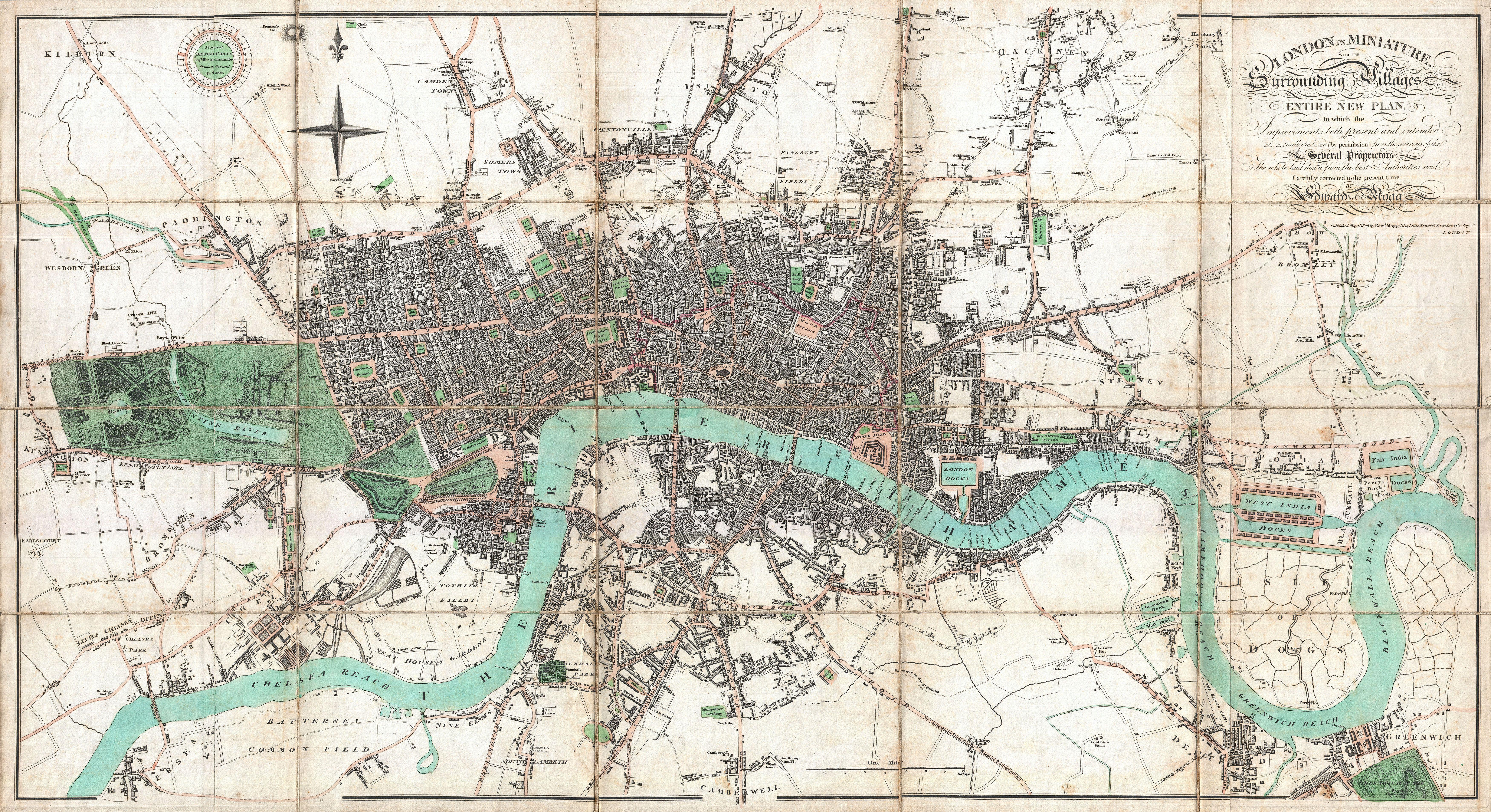
-
uncoquettish
"Coquette: a woman (more or less young), who uses arts to gain the admiration and affection of men, merely for the gratification of vanity or from a desire of conquest, and without any intention of responding to the feelings aroused; a woman who habitually trifles with the affections of men; a flirt" (OED).
-
quiz
"Senses relating to oddness or eccentricity. Now rare and arch" (OED).
-
charge
"The duty or responsibility of taking care of (a person or thing); care, custody, superintendence" (OED).
-
bustle
"To be fussily or noisily active; to move about in an energetic and busy manner; to make a show of activity" (OED).
-
age
“A long but indefinite space of time . . . often loosely in exaggeration” (OED).
-
millinery
“The articles made or sold by milliners . . . ‘fancy’ wares and articles of apparel, esp. of such as were originally of Milan manufacture, e.g. ‘Milan bonnets’, ribbons, gloves” (OED).
-
devoirs
“A dutiful act of civility or respect; usually in pl., dutiful respects, courteous attentions, addresses; chiefly in phr. to do or pay one’s devoir(s (to some one)” (OED).
-
gouty
“Affected with gout . . . [s]wollen or bulging, so as to be out of shape or disproportioned” (OED).
-
proviso
“A clause inserted in a legal or formal document, making some condition, stipulation . . . provision” (OED).
-
country–dancing
"A rural or traditional dance, esp. in England and Scotland; spec. one in which couples begin by standing face to face in long lines" (OED).

-
cotillions
"The name of several dances, chiefly of French origin, consisting of a variety of steps and figures" (OED).
-
vehemence
"Intensity or strength of smell or colour" (OED).
-
middling
"Of medium or moderate size, strength, quality, etc" (OED).
-
sword–case
"A case to hold a sword; in mod. use, a receptacle at the back of a carriage for swords, sticks, or other articles" (OED).
-
Curricle
"A light two-wheeled carriage, usually drawn by two horses abreast" (OED).

-
haggling
"To mangle with repeated irregular cuts or cutting blows; to cut clumsily, with uneven jagged edges; to hack, mangle, mutilate" (OED).
-
-
annotatingausten.sfsuenglishdh.net annotatingausten.sfsuenglishdh.net
-
phaetons
 "A type of light four-wheeled open carriage, usually drawn by a pair of horses, and having one or two seats facing forward" (OED).
"A type of light four-wheeled open carriage, usually drawn by a pair of horses, and having one or two seats facing forward" (OED). -
the lady had asked whether any message had been left for her; and on his saying no, had felt for a card, but said she had none about her, and went away
Here, the narration refers to a “card”, which is more properly known as a calling card. A calling card -- or visiting card-- is defined as “a card bearing a person’s name and address, sent or left in lieu of a formal social or business visit; a visiting card” (OED). Originally a Parisian trend, these cards were either sent or left at a person’s place of residence to denote that acquaintance had formally visited while they were away or later intended to visit them (Robert Chambers, The Book of Days, np).
-
counterpoise
"Something of equivalent force, effect, or weight on the opposite side, that which serves as a counterbalance or set off" (OED).
-
simpleton
This is a more-or-less archaic word in the sense that it is not often used in modern times, however in the late eighteenth/early nineteenth century it was a euphemism for fool or idiot (OED).
-
Argyle Buildings

The Argyle Buildings are located on Argyle Street in Bath. It is a famous street located in the center of the city that was - and still is - popular with tourists for hotels, pubs, spa resorts, and venues for social gatherings (Alexander Whitelaw, Conversations Lexicon, 464).
-
gay
While in Austen's time the word "gay" could be defined as lighthearted, fun, or happy, in modern times it is more traditionally used as a synonym for "homosexual." Also, while in Austen's time it was a positive word, nowadays it is even sometimes used as a slang for something negative or disagreeable, or a slur (OED).
-
brickbat
"A piece of fragment of a brick... It is the typical ready missile, where stones are scarce" (OED).
-
elucidated
"To throw light upon, clear up, explain" (OED).
-
chair
"A light vehicle drawn by one horse; a chaise; also a particular kind of light chaise" or "an enclosed chair or covered vehicle for one person, carried on poles by two men; a sedan" (OED).
-
hallooing
"To shout in order to attract attention; to holla" (OED).
-
remonstrances
"A forcefully reproachful protest" (OED).
-
disconcert
"Disturb the composure of; unsettle" (OED).
-
sprigged muslin
"Any of various lightweight cotton fabrics in plain weave. Also: a piece of such fabric; a dress or other article of clothing made of muslin" (OED).
From the 17th century to the late 18th century, muslin fabric was mostly imported from places like India. The fabric was used for dresses and curtains and was notably well liked for its simplicity; its ability to drape beautifully; and for the fabric's ability to take paint, dyes, and embroidery very well. Muslins were mostly worn by gentility in the color white. The color white was used to signify the gentility's wealthy lifestyle because white garments were harder to keep clean and were very expensive to constantly have laundered to maintain the pure white color. (Jane Austen’s World)
Here is an example of a sprigged muslin which is named for the muslin's unique design which resembles sprigs of leaves or flowers all over the dress:
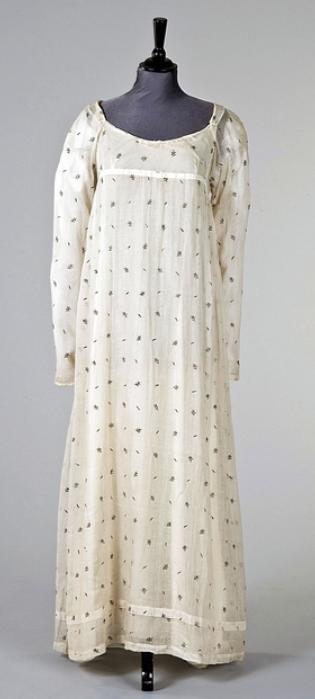
-
coppice
"An area of woodland in which the trees or shrubs are periodically cut back to ground level to stimulate growth and provide firewood or timber; Cut back (a tree or shrub) to ground level periodically to stimulate growth" (OED).
-
jade
"A term of reproach to women" (Regency Assembly Press).
-
-
annotatingausten.sfsuenglishdh.net annotatingausten.sfsuenglishdh.net
-
mental endowments
Austen uses the term "endowment", to draw attention to the acquisition of knowledge not innate ability. “The word may be properly used in opposition to the gifts of nature” (Johnson).
-
address
The word "address" in this context is different from the modern definition of a place of residency. In this context, "address" refers to a "manner of addressing another" (Johnson).
-
rapturous
"A state of intense delight or euphoria" (OED).
-
striking environs
The striking surroundings that are within her view (Johnson).
-
machinations
The plotting of a malicious contrivance against Catherine (OED).
-
affectation
An artificial behavior or putting on of airs (OED).
-
fag
"Weariness, toil, fatigue, drudgery" (OED).
-
tenour
"The general sense or meaning, drift, import, effect" (OED).
-
archness
"Cleverness, good humoured slyness" (OED).
-
- Apr 2016
-
christmind.info christmind.infoJune 41
-
All the mutually agreed upon definitions have as their purpose: to protect and maintain the ongoing ignorance of your divinity, by preoccupying you with your independent status and its improvement with the promise that you can become a presence of excellence without a Source.
Tags
Annotators
URL
-
-
nerdfiles.net nerdfiles.net
-
Define "throwback".
-
-
annotatingausten.sfsuenglishdh.net annotatingausten.sfsuenglishdh.net
-
fickleness
Inconstancy, changeableness.
-
honours of her house
"The duties of house." As the only female family in residence at Northanger Abbey, Miss Tilney would be expected to act as the hostess.
This duty would normally be performed by the wife of the household, and in her absence, the eldest daughter or at times, the sister of the host.
-
superciliousness
The quality or character of being supercilious; haughty, proud, arrogant or contemptuousness.
-
particulars
Details.
-
want of
Lack of/ absence of.
-
spirits
Enthusiasm/enjoyment.
-
did not admit of a doubt
Could not be doubted.
-
ease
Comfort.
-
to greater advantage
To see someone "to greater advantage" would be to see them in a more positive way.
-
- Dec 2015
-
cityheiress.sfsuenglishdh.net cityheiress.sfsuenglishdh.netACT III11
-
canting
"The action of tilting, sloping, turning over or about" (OED).
-
cozening
"To cheat, defraud by deceit" (OED).
-
Nonconformist−Parsons
A clergyman who (especially after the Act of Uniformity of 1662) who is separated from the Church of England; another way to say a Protestant Dissenter (OED).
-
Conventicles
"An assembly, a meeting; esp. a regular meeting of any society, corporation, body, or order of men" (OED).
-
Jew
“As a name of opprobrium applied to a grasping or extortionate person (whether Jewish or not) who drives hard bargains.” Often used as an offensive and derogatory word as so in the context. (OED)
-
Am I a Jew, a Turk?
Jews are considered tradesmen who have no faith (Grose). Turks are considered cruel, coldhearted men (Grose).
-
forelock
Regarded as a piece of a horse-harness (OED).
To take fortune, also regarded as time, by the forelock means to sieze an opportunity. (Oxford Dictionaries)
-
Healths
The term “healths," refers to to an alcoholic beverage, the act of drinking, and the act of toasting while drinking. (OED)
-
Philander
A male lover (OED).
-
Cavalier
A term for a 17th century Royalist; “a name given to those who fought on the side of Charles I in the war between him and the Parliament” (OED).
-
Swain
A servant or an attendant, usually male. (OED)
-
-
cityheiress.sfsuenglishdh.net cityheiress.sfsuenglishdh.netACT I8
-
Coxcombs
Noun. A fool, simpleton (obs.); now, a foolish, conceited, showy person, vain of his accomplishments, appearance, or dress; a fop; 'a superficial pretender to knowledge or accomplishments'. (OED)
-
Sempstresses
Alternate word for seamstress. (OED)
-
Mercers
Noun. A person who deals in textile fabrics, esp. silk, velvet, and other fine materials; spec. a member of the worshipful Company of Mercers, a livery company of the City of London. Also (occasionally): a dealer in haberdashery. (OED)
-
beseech
v. to beg ernestly for, entreat (a thing). (Oxford English Dictionary)
-
By George
Phrase. Used as exclamation or mild oath. (OED)
-
wooing
- (WOO v.) To sue to or solicit (a woman) in love, esp. with a view to marriage; to pay court to, court.
-
Fiddle−stick
- (FIDDLE-STICK noun). The bow strung with horsehair with which the fiddle is played. the devil rides on a fiddle-stick: = here's a fine commotion.(OED)
-
obdurate
- trans. To make obdurate (OBDURATE adj. 1); stubbornly unapologetic; to harden in wickedness, or against moral influence; to harden the heart. (Oxford English Dictionary)
Tags
Annotators
URL
-
-
cms.whittier.edu cms.whittier.eduuntitled1
-
‘quality of life’
(QOL)- general well being of individuals and societies. QOL has a wide range of contexts including fields of international development, healthcare, politics, and employment (Google/Wikipedia)
-
-
cityheiress.sfsuenglishdh.net cityheiress.sfsuenglishdh.netACT IV13
-
Oyster−Woman
A woman who gathers, cultivates and/or sells oysters.
Oyster-women were associated with bawds, whores, and beggar women that took part in a 1637 riot in a church that made so much noise that it drowned out the service. They were described by a royalist newspaper as a carnivalesque mob.
-
Cherubin
A conventional representation of an angel. (OED)
-
Cozen’d,
To cheat, defraud by deceit. (OED)
-
Jack−sauce
"Jack-sauce" n. Obs. a saucy or impudent fellow. (OED online)
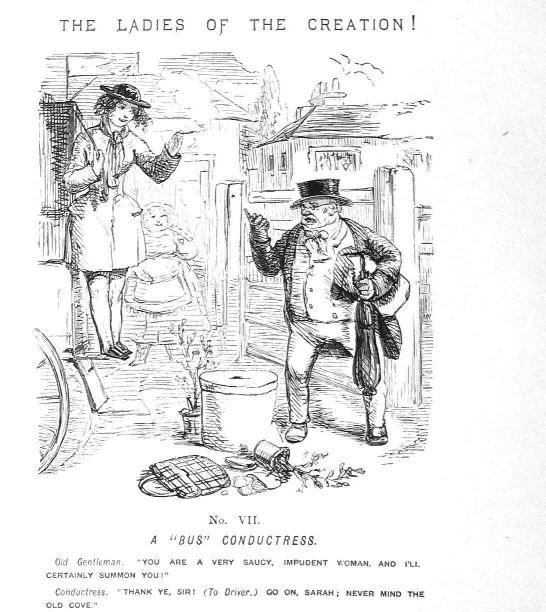
-
scruples
A thought or circumstance that troubles the mind or conscience; a doubt, uncertainty or hesitation in regard to right and wrong, duty, propriety, etc.; esp. one which is regarded as over-refined or over-nice, or which causes a person to hesitate where others would be bolder to act.
-
Rakeshame
A disreputable or dissolute person; a rogue
-
censorious
censorious (adj.) - severely critical, judgmental, condemnatory
-
Jilts
A woman who has lost her chastity; a harlot or strumpet; a kept mistress
-
Hackney
A woman that hires her person, a prostitute

-
Baud
One employed in pandering to sexual debauchery; a procurer or procuress; orig. in a more general sense, and in the majority of passages masculine, a ‘go-between,’ a pander; since c1700 only feminine, and applied to a procuress, or a woman keeping a place of prostitution; a woman in charge of a brothel

-
Tittle−Tattle
An act or spell of petty talk; an item of small talk or gossip
-
Wag, an arch Wag
Wag (n.) - a joker, mischievous person
arch Wag (n.) - an extreme joker
-
Bill Ignoramus
Legal term also called a bill "not found." Meaning there is insufficient evidence of charges brought forth - the indictment is dropped and the accused is released.
-
-
cityheiress.sfsuenglishdh.net cityheiress.sfsuenglishdh.netACT V9
-
Renegado
"A person who deserts, betrays, or is disloyal to an organization, country, or set of principles; a turncoat, a traitor" (OED).
-
Commonwealthsmen
"good citizen, patriot"(OED).
-
Infantas
"A daughter of the king and queen of Spain or Portugal; spec. the eldest daughter who is not heir to the throne." (OED) is the literal meaning. However, it can be "[a]pplied analogously or fancifully to other young ladies." (OED)
-
Harangue
"A speech addressed to an assembly; a loud or vehement address, a tirade; formerly, sometimes, a formal or pompous speech" (OED).
-
Alderman Draw−tooth
Alderman meaning a man and "Draw-tooth" was in reference to the action of getting his teeth pulled.
-
Billet−Doux
From French, Billet-Doux means "love letter" (billet meaning "note", and doux meaning "sweet"). (OED)
-
Portmantle
"A case or bag for carrying clothing and other belongings when travelling; (originally) one of a form suitable for carrying on horseback," (OED).

-
Conclave of Cardinals
"The place in which the Cardinals meet in private for the election of a Pope," (OED).
-
Lanthorns
Another way to spell lantern, mainly because the lanterns glass was made of boiled horns.
-
-
cityheiress.sfsuenglishdh.net cityheiress.sfsuenglishdh.netACT II8
-
Coxcomb
A fool or simpleton; a foolish, conceited, showy person, vain of his accomplishments, appearance, or dress; a fop (OED).

-
Felicity
The state of being happy, also referring to that which causes or promotes happiness; a source of happiness, a blessing (OED).
-
Railers
A person who rails, especially a person who rants, or is argumentative or abusive (OED).
-
Pox
Can be used to mean a curse or hex that someone wants placed upon someone or something. (Grammarist.com)
-
Souse
A French coin (OED).

-
dead Lift
A position or juncture in which one can do no more, an extremity, ‘a hopeless exigence’ (Johnson). Usually in phrase at a dead lift. (Very common in the 17th c.: now arch. or dial.) (OED)
-
pick−thank
A person who curries favour with another, esp. by informing against someone else; a flatterer, a sycophant; a telltale. (OED)
-
‘Slife
An abbreviation of God's life (see god n. and int.Phrases 3b(a)) used as a petty oath or exclamation. (OED)
-
- Nov 2015
-
newclasses.nyu.edu newclasses.nyu.edu
-
in-room” interaction provides opportunities for sociality, joint projects, and empowermentthrough sharing one’s knowledge and seeing it used for concrete success by others. Sincethis interaction occurs primarily without adult guidance or direction, it may be that thekid-organized and kid-managed aspects of these contexts—for kids of this preteen and earlyteen age—make them powerful learning contexts
Their key elements of a "good learning environment" - sociality, joint activity, sharing knowledge, concrete successes, self-guidance and organization.
I understand these elements to be related closely to those described in Lave and Wenger's discussion of LPP and apprenticeship learning
-
our goal isnotto provide causal explanations of transfer between videogame play and other life activities, but rather to provide a set of careful descriptions of how“in-game” activity is tangled up with activity “in-room,” and in the wider worlds of activitythat young people inhabit.
I like thinking of this game play as "tangled up with other cultural practices." I see this as multisited work, and actually helps me understand the interconnectedness of multisited work better.
-
- Oct 2015
-
newclasses.nyu.edu newclasses.nyu.edu
-
“guided participation.” Guided participation has a dualmeaning: It emphasizes how adults help to structure children’s developmental tra-jectories and also the active participation by children in these processes.
Clear definition of "guided participation" - refers to both the role of the adult or teacher and the active participation of the learner
-
-
inst-fs-iad-prod.inscloudgate.net inst-fs-iad-prod.inscloudgate.net
-
precludes
to prevent something from happening
-
- Sep 2013
-
rhetoric.eserver.org rhetoric.eserver.org
-
(1) the speaker's power of evincing a personal character which will make his speech credible (ethos ); (2) his power of stirring the emotions of his hearers (pathos ); (3) his power of proving a truth, or an apparent truth, by means of persuasive arguments (logos )
-
